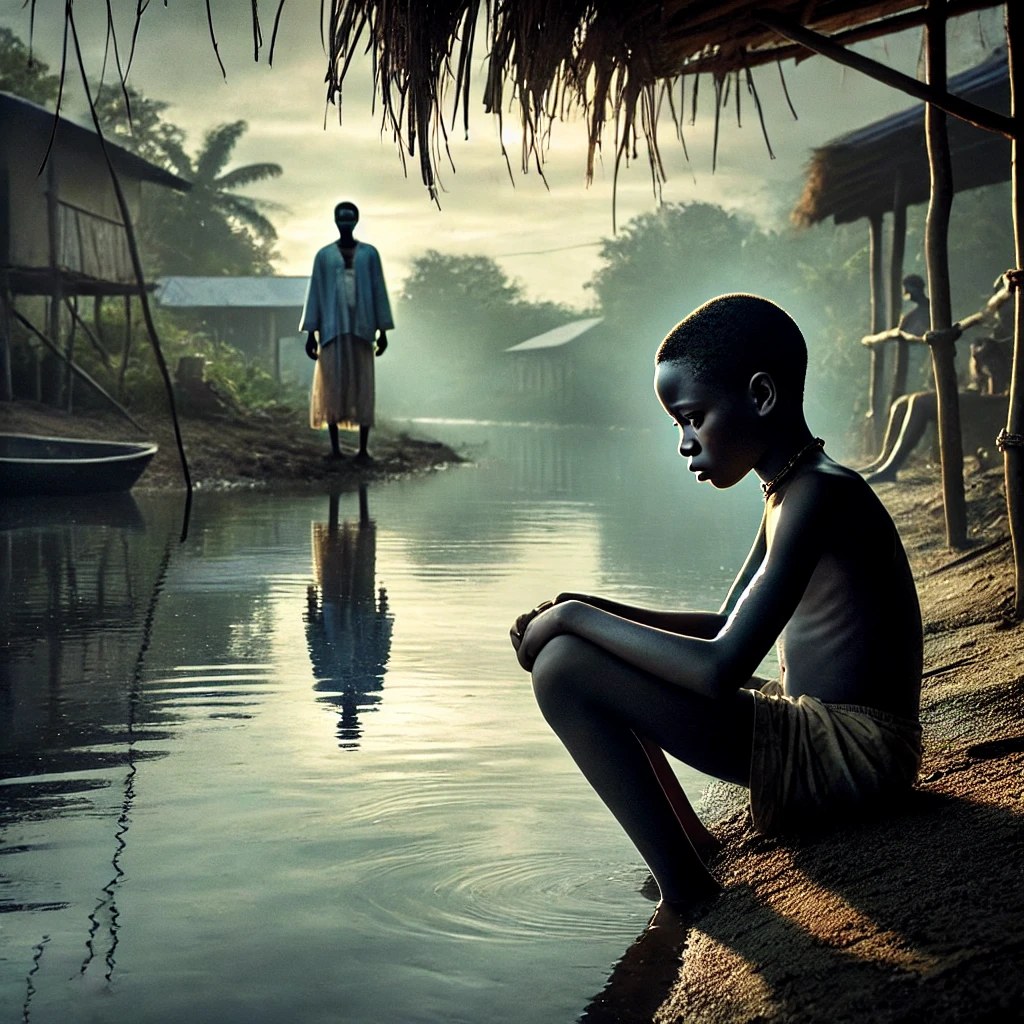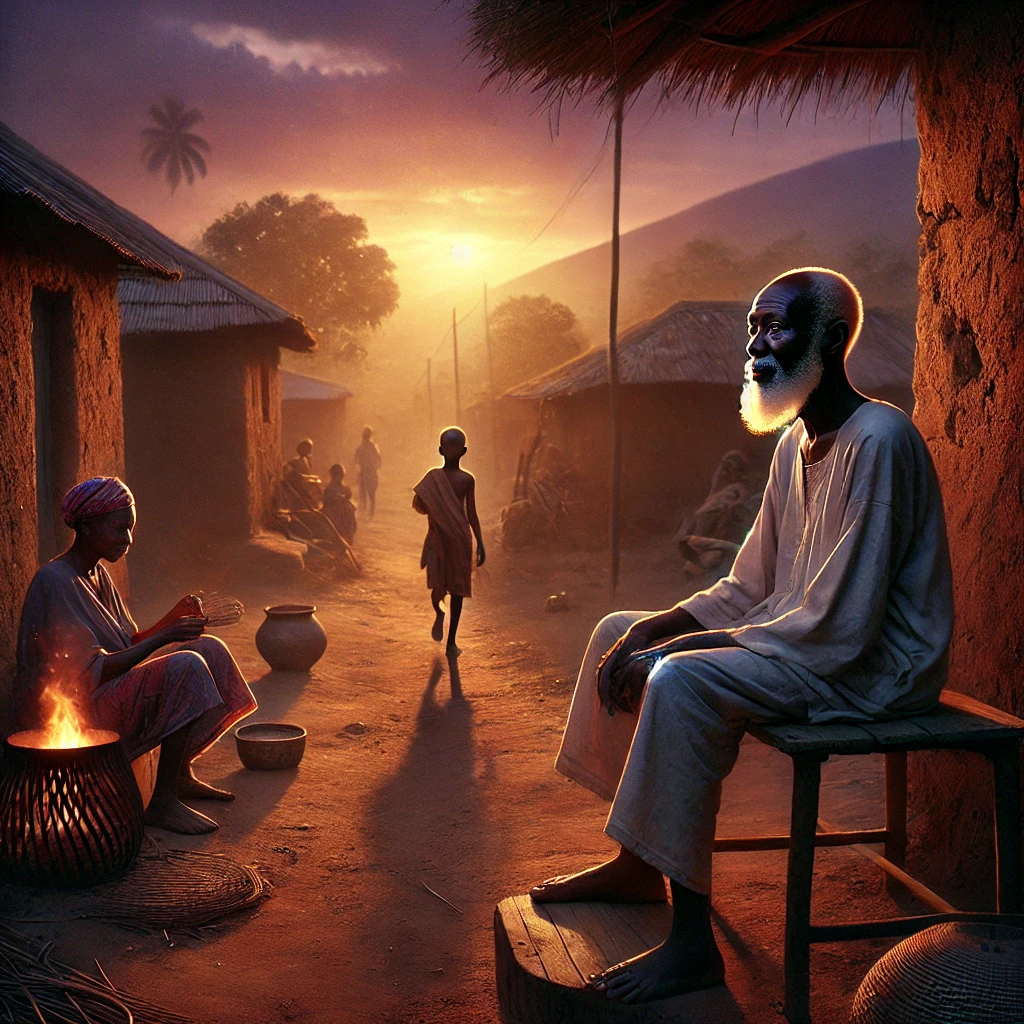

The Change, Tunde The Orphan Part 5, African Nigerian Stories, Folktales
The Change, Tunde The Orphan Part 5, African Nigerian Stories, Folktales
The weeks following Tunde’s return brought a peculiar stillness to the village. No longer was he the boy who ran through the fields with laughter, nor the mischievous spirit who would leave the villagers sighing in exasperation. Instead, Tunde had become a ghostly figure, quiet, distant, as though something vital within him had been drained. Where his presence once filled every corner with liveliness, he now moved with a slowness that unnerved even the most seasoned elders.
Each day, as the sun rose, Tunde would drift from the house to the riverbank, where he would sit in silence, his gaze fixed on the water. The river, usually a place of joy for the village children, now seemed heavy, like it was holding secrets just below its shimmering surface. Baba Mufu watched from afar, concern deepening each day as he observed his grandson’s hollowed-out expression, the boy’s dark eyes focused on something he alone could see.
One day, as Baba Mufu approached him by the river, he noticed that Tunde was moving his lips, though barely a sound came forth. The words, whispered softly, had a rhythmic cadence, like a prayer or a chant, the kind Baba Mufu had only heard during rites of remembrance or ancestral prayers. He leaned closer to hear, but as he did, Tunde abruptly fell silent, his eyes never leaving the water.
“What is it you see, Tunde?” Baba Mufu asked, his voice calm but edged with the worry he could not shake.
Tunde did not look at him. Instead, he whispered, “She’s still there, Grandfather. Watching me. Waiting.”
Baba Mufu felt a chill run through him. “Who do you mean, Tunde?”
Tunde’s lips tightened, and he shook his head, returning his gaze to the river. Baba Mufu’s heart sank, a gnawing fear taking root deep inside him. Whatever had happened to Tunde by the river, whatever he had seen, had taken something from him. And Baba Mufu felt powerless to bring it back.
Mama Tinu, noticing the change in Tunde’s demeanor, tried everything she could to lift his spirits. She cooked his favorite meals, filling the air with the fragrant aroma of spiced peppers, jollof rice, and stewed goat. She told him stories of their ancestors—tales of warriors and storytellers, of women and men who had brought honor to their family. But Tunde would only nod politely, taking small bites, his mind seemingly miles away, lost in some distant memory or vision.
One evening, as she was finishing a story about Tunde’s great-grandfather, a skilled hunter, Mama Tinu looked at her grandson with pleading eyes. “Tunde, do you remember when you used to run through the fields pretending to be a great hunter? You were fierce and brave, just like your great-grandfather.”
Tunde looked at her, his eyes dark and unreadable. For a moment, she thought he might smile, that he might say something that would bring a spark of hope. But instead, he simply nodded, murmuring, “Those were only games, Mama. The river holds things much older and far more powerful.”
With that, he returned to his silent vigil, his gaze fixed on a point far beyond the walls of their home. Mama Tinu’s heart broke a little more each time he spoke in these strange riddles, hinting at things he could not—or would not—explain.
The villagers, too, had noticed Tunde’s transformation. Children who had once played alongside him now avoided his path, their mothers urging them to keep a safe distance. The elders exchanged worried glances, muttering quietly among themselves about the dangers of the spirit world and the costs of trespassing into sacred spaces.
“He has been marked,” one old woman whispered as Tunde passed by one morning. Her voice was barely audible, but the words carried a weight that settled heavily on the others’ minds.
The villagers spoke of Iya Osun, the guardian spirit of the river. She was both revered and feared, known to protect the waters with a fierce vengeance against any who disrespected her realm. Some said Tunde had seen her face, that she had marked him in ways that would never fade. Others believed he had become a vessel for the spirit’s whispers, bound to listen and speak only of things beyond mortal understanding.
Baba Mufu grew increasingly uneasy with each passing day. He tried to reason with himself, to dismiss the tales as the product of fear and superstition. But Tunde’s behavior defied all explanation. He had returned to them in body, yet his spirit seemed to linger elsewhere, caught between the world of the living and some other place they could not see.
One morning, Baba Mufu decided to follow Tunde down to the river. As Tunde settled onto the familiar patch of grass, his eyes fixed on the flowing water, Baba Mufu sat nearby, close enough to observe but far enough not to disturb. He watched as Tunde’s lips moved, the words soft and barely distinguishable, like the murmurs of someone in prayer.
“Tunde,” Baba Mufu called gently.
The boy didn’t respond, his focus remaining on the river. Baba Mufu tried again, leaning forward. “Tunde, please. Talk to me.”
Slowly, Tunde turned, his expression blank, his gaze unsettlingly empty. “The river does not forget, Grandfather,” he said, his voice hollow. “She told me so herself.”
Baba Mufu felt a chill run through him. “What does that mean, my son?”
Tunde’s lips pressed together, his gaze drifting back to the water. “I cannot say, Grandfather. She… she is always there, even when I sleep.”
Baba Mufu clenched his fists, his heart heavy with fear. He wanted to pull Tunde away from the river, to shield him from whatever force had claimed him. But he sensed that the river’s hold on Tunde was not one that could be broken by mere distance. This was something far more profound, something that defied reason and logic.
When they returned home, Baba Mufu shared his concerns with Mama Tinu. She listened silently, her hands twisting nervously in her lap. She, too, had noticed the changes in their grandson, the strange words, the eerie silences. Yet she clung to a small sliver of hope, believing that perhaps he would recover, that the river’s hold would weaken with time.
“Perhaps he just needs us,” she whispered, a touch of desperation in her voice. “Perhaps if we show him love, he will find his way back to us.”
But despite her efforts, Tunde remained as distant as ever. His days were spent in silence, his nights filled with restless murmurs. At times, he would wake in the middle of the night, his voice low and steady, reciting strange words that sounded like chants, words neither Baba Mufu nor Mama Tinu could understand.
News of Tunde’s strange behavior spread quickly through the village. People began to avoid him, some even crossing to the other side of the road when he passed. The villagers feared that he had brought something dark back with him, that he had become a vessel for the river’s spirit, carrying whispers of things that should remain hidden.
One evening, Elder Oba approached Baba Mufu as he sat outside, staring into the fading light. Oba’s face was grave, his eyes filled with sympathy.
“I know you do not believe in these things, Mufu,” Oba said, his voice gentle yet firm. “But the river is a place of spirits. Tunde has been touched by forces beyond our understanding. Perhaps… perhaps he needs cleansing, a rite to free him from whatever binds him to the river.”
Baba Mufu shook his head, struggling to hold back tears. “He is my grandson, Oba. I do not want him treated like he is cursed.”
Oba placed a comforting hand on Baba Mufu’s shoulder. “The spirit world does not always mean harm, Mufu. But sometimes, those who return from it carry marks that must be healed. Think on it, my friend. If there is any way to bring Tunde peace, it is worth considering.”
That night, Baba Mufu sat by Tunde’s bedside, watching as the boy slept fitfully, his lips moving silently as if speaking to something only he could see. He looked so fragile, so worn, and Baba Mufu’s heart ached with the knowledge that he could do nothing to ease his grandson’s pain.
Over the next few days, Baba Mufu wrestled with the idea of taking Tunde to the village priest, hoping that perhaps some ritual might free him from the river’s hold. But each time he considered it, a voice deep within him resisted. Tunde was his family, his blood. He could not bear the thought of subjecting him to rites that spoke of fear and suspicion.
And yet, Tunde’s behavior grew stranger. He spent hours sitting by the river, muttering in the strange, rhythmic cadence that chilled anyone who heard it. Mama Tinu, heartbroken by the boy’s distance, began to pray, calling upon their ancestors for guidance, hoping that some unseen force might intervene.
One evening, as the sun dipped low and cast the river in a golden glow, Tunde turned to Baba Mufu, his face calm but his eyes filled with a deep, unfathomable sadness.
“She told me something else, Grandfather,” he murmured.
Baba Mufu felt his breath catch. “What did she say, Tunde?”
Tunde hesitated, his gaze dropping to his hands. “She told me… that I am hers now, that the river holds me in ways no one else can.”
A heavy silence settled












